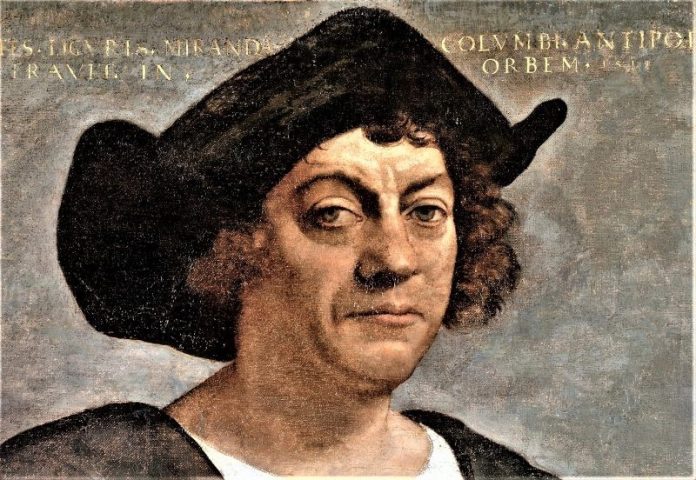Christopher Columbus was a Catholic explorer. Some misguided historians would have us believe the Catholic Church sent him and the missionaries who accompanied him to destroy pagan civilizations wherever he found them. The point is never stated exactly that way, but the evidence non-Catholic historians bring to bear on the discovery of America leaves no doubt that the natives of the region of Central America, where Columbus landed, have mainly him to thank for the ruin of their civilization. And of course, since he brought with him only Catholic soldiers, settlers, and monks (all dispatched to the New World by Catholic monarchs Ferdinand and Isabella) … the plot thickens.
But we should concede that Columbus, while a great navigator who stumbled upon the New World, was ill equipped to understand what he discovered. Ever in search of gold to prove the worth of his adventures (the same lucrative reason the English Protestants sent settlers to North America), Columbus sometimes mismanaged the colonies he set up. He treated the natives less fairly than they deserved (as did the English Protestant settlers treat the Indians of New England). But no one doubts that Columbus wanted to Christianize the newly discovered tribes; nor can there be any doubt that some tribes truly needed converting (the Caribs in particular, noted for cannibalism and their infamous treatment of the Arawaks).
Diane Moczar, in her revealing little book, Seven Lies about Catholic History, refutes another of the other so-called “dirty little secrets” about the Catholic destruction of native American cultures. Moczar zeros in on the history of Mexico. English historians have always propagandized against the conquests of Spain (as if they did not have enough ugly conquests of their own to contend with). The fall of the Aztec Empire is attributed by some to Cortez and his paltry three hundred soldiers. The Aztecs, however, had made many enemies of Indian tribes in Mexico. Their bizarre religion (comparable to the Thuggee sect of India) required human sacrifice by the tens of thousands, the tearing out of the hearts of their victims, the beheading of them, and assorted other cruelties including cannibalism (this proving in the starkest way possible that not all religions lead to God, some lead to the Devil). Mel Gibson’s movie (Apocalypto 2006) portrays in vivid detail the demonic character of the native religion Columbus brought to an end.
Charles V of Spain in 1527 appointed the first Bishop of Mexico, Juan de Zumárraga, as “Protector of the Indians.” Soon charitable organizations, including the first hospitals and orphanages, were flourishing. Mines and farmlands were developed and schools were built to educate the young Aztecs who proved to be eager learners. Then came the miraculous appearance of Our Lady of Guadalupe, and the imprint of her image upon the apron of the peasant Juan Diego. Within a few years six million Aztecs were converted to Christianity. After the Spanish intermarried with the Indians, Mexico soon became a homogeneous Christian civilization.
Anyone who wishes to understand the psychology of racist and religious propaganda only needs to read Philip Wayne Powell’s Tree of Hate: Propaganda and Prejudices Affecting United States Relations with the Hispanic World. What Bishop Sheen said of how enemies of the Church view the Church in America applies equally to the story of Spanish conquest of Central and South America:
If we Catholics believed all the lies and calumnies that are told about the Church, we would hate it ten times more than bigots do. The enemies of the Church often do not hate the Church: they only hate what they erroneously believe to be the Church.
So far, in recent decades the “woke” hatred of Columbus seems endlessly senseless with 36 American monuments to the great explorer removed or destroyed, as if to erase both the image of Columbus and his monumental legacy. However, it should be remembered that left wing propagandists have no use for traditional Catholic heroes and are happy to supply and exaggerate whatever scandals they can find, real or imagined. Had the discoverer of the Americas been a Protestant Englishman, would historians be treating him more favorably than they treat Columbus? It is all part of the so-called progressive movement of our times, that the Catholic past must be forgotten or lied about so that the future can be created new and unburdened by the traditions of that past. So much better is that great insight of philosopher George Santayana:
“Those who cannot remember the past are condemned to repeat it.”












